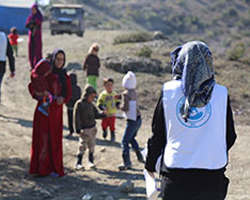Health services for northern Syria

SIG
Amid conflict, WHO and partners work under extreme conditions to provide health services in hard-to-reach and besieged areas of northern Syria.
In line with the UN ‘s “whole-of-Syria” approach, WHO brings together and coordinates health care groups providing life-saving interventions to people in need across lines and borders. The WHO field office in Gaziantep, a Turkish city near the Syrian border, has served as operational hub since 2013.
Addressing needs for medical supplies, treatment, prevention and training
With WHO’s technical guidance and support, health partners:
- deliver medicines and other supplies;
- vaccinate hundreds of thousands of Syrian children against polio, measles, diphtheria and other diseases;
- treat burns and severe injuries;
- provide primary health care to more than a million people;
- prepare for outbreaks, like cholera;
- care for patients with diabetes and other noncommunicable diseases;
- identify the signs of psychiatric trauma and refer patients for proper care;
- train health care workers.
However, attacks on health care facilities, humanitarian convoys and warehouses impede the delivery of these health operations. WHO therefore strongly condemns attacks on humanitarian and health workers, as well as on civilians, as this obstructs people’s right to access health and humanitarian support.



